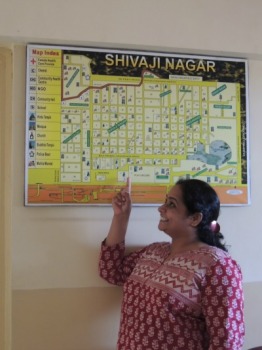
Meet the researcher: Shweta Bankar
Adolescent Girls, Adolescent Wellbeing and Youth Development, Adolescents and Youth, Sports for Development
15 December 2014
Media Contact
All year, you’ve heard about ICRW’s amazing research and programs, which are helping organizations, individuals, and decision-makers in the international development community better understand challenges to empowering women and girls to end poverty. But you may not know about the people behind the research and programs. ICRW’s Meet the Researcher series is designed to give you insight into ICRW’s staff who are working around the world to ensure that every woman and girl around the world has a chance to succeed. Today, you’ll meet Shweta Bankar, a senior research associate in ICRW’s Mumbai office.
How do you describe your work and ICRW’s work to your friends/family?
We work towards women and men realizing their rights and living together realizing that they are equals; none of us should be prone to violence and discrimination.
What is most meaningful to you about the work you do?
What’s so meaningful about my work at ICRW is the work that I do with adolescent girls, empowering them to live better lives and giving them a way forward. Adolescence is a critical time, when girls need the tools to help them move forward in life and pursue their dreams. During adolescence, it’s crucial that girls know their rights. Without that knowledge, it’s difficult to succeed in their community and in the world. The opportunities we’re presenting give parents the chance to instill in girls that they have high worth. As a result, if a young girl’s life is built upon a strong base, her life changes, her family’s perceptions change, and it gives her the ability to start her own family and instill in her future children those important principles. Working at ICRW and in slum communities in Mumbai, we know that when we do things right, we can create a world without discrimination.
What has been your most memorable moment at ICRW?

Recently, mentors in our Parivartan program to empower women and girls shared stories about their lives and experiences. Compared to when they first started the program, you could literally see the difference in confidence in the girls. At first, the girl mentors, ranging in age from 18-24, weren’t confident or open, but then there was a shift: the girls could speak about their personal lives in front of a room full of people. At that moment I thought, “YES, we are going in the right direction!” One girl in particular really stuck out for me. She spoke about how she was held back by her family, who did not want her to participate in the program as a mentor. She had the confidence to share her story and the hurdles she overcame. In my experience, even girls who already feel empowered may have given up when facing the challenges this mentor faced, including resistance from her family and an impending marriage. Yet she negotiated with her parents and her husband-to-be to postpone the date of marriage so that she could participate in the program as a mentor and continue her education as well. She is now enrolled in her second term of college.
Why should people support ICRW?
We don’t just work with numbers and data, we work with entire communities, families, and individuals to understand in-depth the challenges women and girls face. And we’re not just documenting a problem. Once we conduct our research, we take the numbers and stories and use them to bring about positive change that will have a lifetime’s effect on girls. For many adolescent girls, the notions about what their role is as a girl living in a low income community have been instilled in them their entire lives. It’s challenging to break down those expectations and help girls understand they can be empowered beyond that. In order to sustain this change (not just create it), we must ensure we are able to stay in these communities to continue working with girls and their families to make sure that the changes become permanent and will be passed down from generation to generation.
If you could have dinner with anyone, past or present, who would it be and why?
Melinda Gates, because I like the way she thinks, the vision she has, and the type of work she does at the grassroots level. She tries to get into the complexities of the problem and break it down piece by piece, making it simpler to move toward an ultimate goal.
What is your wish in the coming New Year?
I would like for girls to be protected and free from the cycle of violence and abuse, and for them to have access to education, counseling and to learn to be proud of themselves. I want them to get out of the cycle of exploitation and discrimination and learn how to prioritize themselves, realizing that they have a right to do so!
